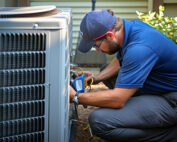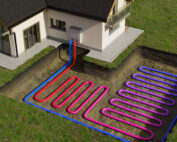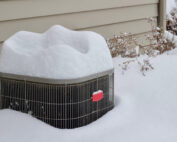Extreme weather can challenge your HVAC system, pushing it to work harder than usual. Knowing how to maintain HVAC efficiency during extreme weather ensures your home stays comfortable and your energy bills stay manageable. Simple steps and regular maintenance can go a long way in helping your HVAC system perform optimally when temperatures hit their extremes.
Schedule Regular Maintenance
Preventive maintenance is critical to ensuring your HVAC system works efficiently. Schedule an annual tune-up before the peak heating or cooling season begins. During a tune-up, a technician will inspect your system, clean components, and check for issues. These steps ensure that everything runs smoothly when extreme weather arrives.
Replace or Clean Filters Regularly
Dirty filters are one of the leading causes of HVAC inefficiency and system strain. Over time, filters collect dust, debris, and allergens, which can clog the system and restrict airflow. This forces your HVAC unit to work harder to maintain the desired temperature, leading to higher energy bills and unnecessary wear on the system. Typically, filters should be replaced or cleaned every three months during regular operation. However, during periods of extreme weather, when your HVAC system runs more frequently, it’s recommended to check and replace filters more often—about every 30 days.
Clean filters improve airflow, help maintain consistent indoor temperatures, and ensure better air quality by reducing the circulation of dust and allergens. Regular filter maintenance is a simple yet essential step to keep your HVAC system operating efficiently, especially when it’s under stress from extreme heat or cold.
Seal Air Leaks
Air leaks around doors, windows, or ductwork can reduce your HVAC system’s efficiency. Seal gaps with weatherstripping or caulk to prevent warm air from escaping during winter or cool air from leaking in summer. Proper sealing reduces strain on your system and helps maintain consistent temperatures.
Use a Programmable Thermostat
A programmable thermostat can optimize your HVAC’s operation during extreme weather. Set your thermostat to adjust temperatures when you’re away or asleep. These settings prevent your system from working overtime, reducing energy consumption without sacrificing comfort.
Keep Vents and Ducts Clear
Blocked vents or clogged ducts can hinder airflow, reducing your system’s efficiency. Ensure furniture, rugs, or curtains do not obstruct vents. Have your ductwork inspected and cleaned if necessary, especially before extreme weather seasons.
Increase Insulation
Proper insulation helps your home retain heat during winter and stay cool in summer. Check your attic, walls, and floors for adequate insulation. Adding insulation reduces the workload on your HVAC system and ensures even temperatures throughout your home.
Use Ceiling Fans Wisely
Ceiling fans can complement your HVAC system by circulating air efficiently. In winter, set fans to rotate clockwise at a low speed. This motion pushes warm air near the ceiling down into the room. In summer, reverse the fan direction to create a cooling breeze.
Avoid Drastic Temperature Changes
Setting your thermostat to extreme temperatures can overwork your system. Instead, aim for a consistent and reasonable temperature. For example, during winter, keep the thermostat set to 68°F when home and lower it slightly when away.
Keep Outdoor Units Clear
Your outdoor HVAC unit needs proper airflow to function efficiently. Clear debris, snow, or ice around the unit to maintain airflow. In summer, ensure shrubs and grass clippings do not block the unit. Regularly inspect and clean the area to prevent damage.
Use Curtains and Blinds Strategically
During the day in winter, open curtains or blinds on windows that receive direct sunlight to bring natural heat into your home. This passive solar warmth can reduce the strain on your HVAC system, whether it’s a separate furnace or a heat pump. At night, close curtains or blinds to minimize heat loss through windows, which helps your system maintain consistent indoor temperatures without overworking.
In summer, keep curtains or blinds closed during the hottest parts of the day to block sunlight and prevent heat buildup. For those with a heat pump or combined AC and heating system, reducing the cooling load helps the unit operate more efficiently. Using window coverings strategically year-round supports your HVAC system’s performance while keeping energy bills under control.
Upgrade Your HVAC System if Needed
Older systems may struggle during extreme weather. Upgrading to a modern, energy-efficient HVAC system can reduce energy consumption and improve performance. Look for systems with a high Seasonal Energy Efficiency Ratio (SEER) rating and Energy Star certification.
Monitor Humidity Levels
Extreme weather can affect indoor humidity, making your HVAC system work harder. Use a humidifier in winter to add moisture to dry air or a dehumidifier in summer to remove excess humidity. Maintaining balanced humidity helps your system operate efficiently.
Keep an Eye on Your Energy Bills
A sudden spike in energy bills could signal your HVAC system is struggling. Monitor your bills for unusual increases and address problems promptly. Call a professional to diagnose and fix issues before they escalate.
Maintaining HVAC efficiency during extreme weather is essential for comfort and cost savings. Simple practices like regular maintenance, cleaning filters, sealing air leaks, and using a programmable thermostat can make a significant difference. With these tips, you can keep your system running smoothly no matter how bitterly cold or sweltering the weather gets.
Hot Topics
Recent Posts
What Is Duct Cleaning and Why Do You Need It?
When was the last time you had your air ducts cleaned? If you can’t remember—or [...]
Top Maintenance Tips to Save Energy This Winter
As temperatures drop, homeowners and businesses rely heavily on their heating systems to stay comfortable. [...]
How Do Geothermal HVAC Systems Work?
Geothermal HVAC systems are gaining popularity as a sustainable alternative to traditional heating and cooling [...]
Maintain HVAC Efficiency During Extreme Weather
Extreme weather can challenge your HVAC system, pushing it to work harder than usual. Knowing [...]







